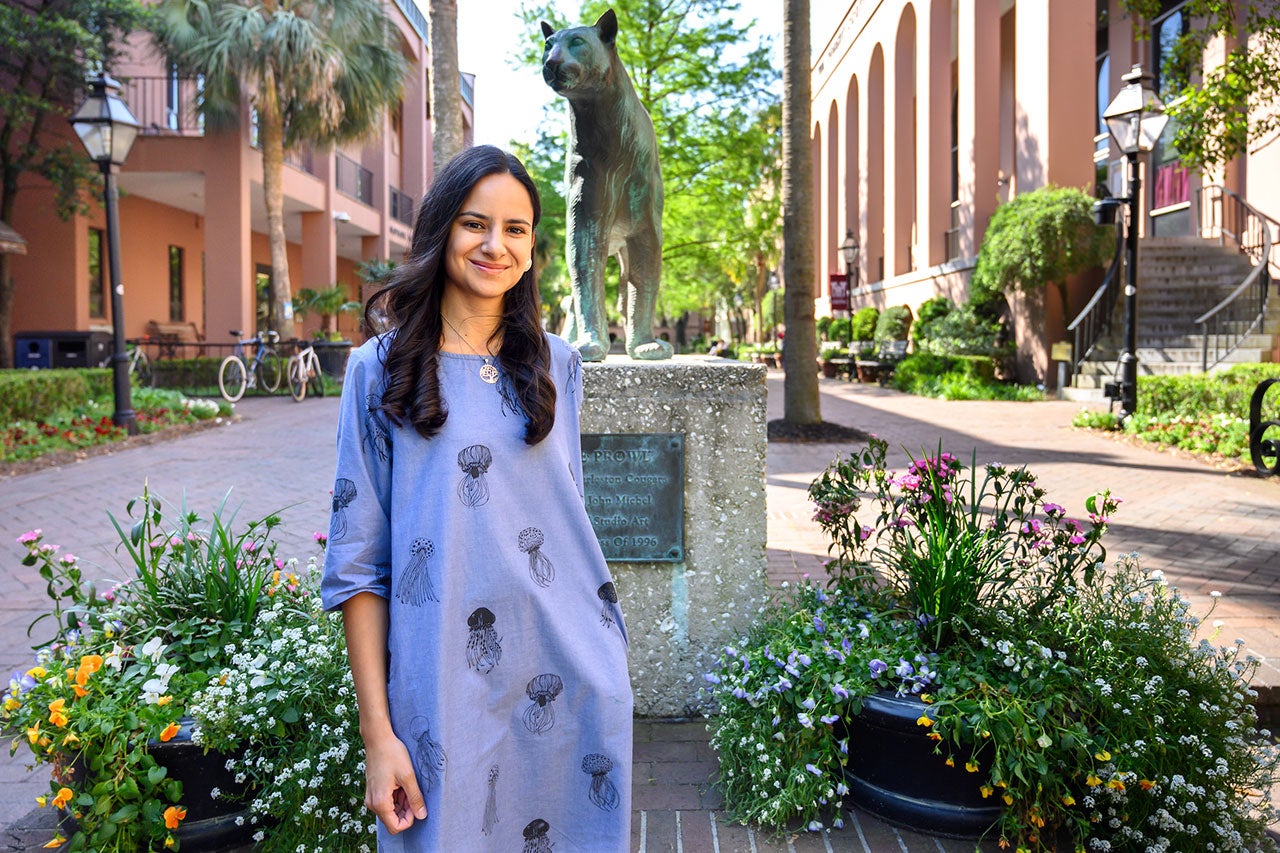As the Class of 2022 prepares for Commencement, May 6–7, The College Today will highlight how some of our graduating seniors spent their time at CofC, and what the future holds.
When graduate student Sofia Troya Zambrano ’20 was researching universities in high school, an adviser mentioned the College of Charleston.
As a native of Quito, Ecuador, Troya grew up surrounded by the snowy volcanoes of the Andes — so a university in close proximity to sunny beaches and warm weather, not to mention one with a reputation for sustainability education, was very appealing to the young student.
“I was told it was a liberal arts school with programs in conservation, and I was very interested in that,” says Troya.
Troya ended up at the College for her undergraduate studies. She earned a bachelor’s degree in political science and minors in geology and environmental and sustainability studies in 2020. Her original plan was to start working right away, but the pandemic changed that. Searching for open positions in conservation was very challenging. So, when Lucy Davis ’20 (M.S.), coordinator of the College’s Master of Science in Environmental and Sustainability Studies (EVSS) Program, reached out to Zambrano and encouraged her to apply to the graduate program, she figured it was something to seriously consider.
“I’ve had a passion for conservation pretty much ever since I was a baby,” explains Troya. “My dad has worked in conservations ever since I could remember. He passed on that love of the environment, for protecting our planet, for ensuring that the resources we have now are present for future generations, and that has always resonated with me.”
This week, a few days before Spring Commencement 2022, Troya will defend her thesis entitled, “Effective Philanthropy for Indigenous Peoples and Local Communities in Conservation” – the final step to earning her master’s degree in environmental and sustainability studies. She focused her graduate thesis on the best practices to involve indigenous people in efforts for climate conservation policies through philanthropic funding.
“I really wanted to understand the needs and goals of the communities and help them align so that the funding can be used most effectively to support the communities’ conservation goals,” she says. “The most interesting thing is that it’s not a one-solution-fits-all sort of situation. It should be evaluated on a case-by-case basis. Most Western granting models tend to simply have the same structures for the grants, but these indigenous communities need grants to be a bit more flexible to be able to meet their specific needs.”
“I’ve been thrilled to have had her in the program and as an advisee,” says Annette Watson, EVSS director and associate professor of political science. “Her work examining the challenges of international conservation was difficult to perform during the context of a pandemic, but she managed to persevere with a series of interviews with Indigenous Ecuadorian leaders that produced great insights about how local organizations can be best supported. I hope this work leads her to a long career in international conservation.”
Troya has interned with The Nature Conservancy’s international global climate team for the past year. She works with teams in Indonesia, China and Colombia to determine natural climate solutions and the potential for those to be incorporated in nationally determined contributions for climate policies.
“It’s the international perspective I’ve wanted to get and having to work with people in Asia, South America and some parts of Europe has been a great experience this past year,” she says.
In addition to her conservation research, Troya has also spent the last year serving as the president of the College’s Graduate Student Association. Most recently, the association put forth an initiative to help students obtain graduation regalia at no cost.
“Purchasing regalia can be very expensive,” she says. “So, we purchased regalia to rent out to students, so it’s not a hurdle to them. This also aligns with the College’s sustainability and zero waste goals.”
After she dons the regalia of a graduate student during commencement on Saturday, May 7, 2022, Troya will turn her attention to finally starting her career. She hopes to find a job in Charleston, or the broader East Coast, working in climate policy.
At last, she can put her studies into action.




